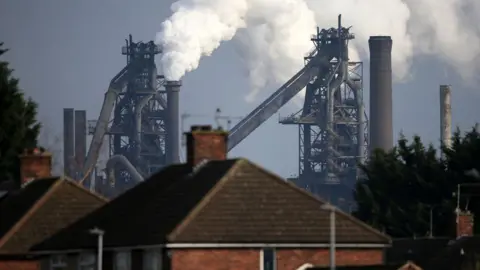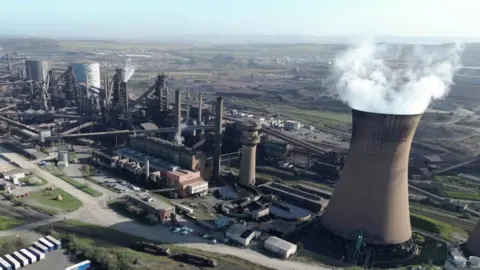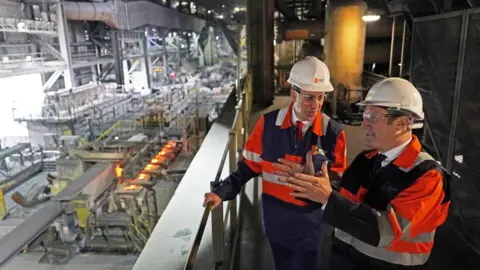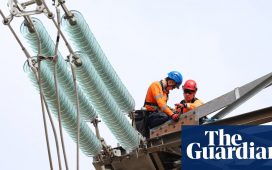Business reporter
 Getty Images
Getty ImagesThe UK government is poised to take control of a major British Steel plant in Scunthorpe, which is at risk of imminent closure.
MPs have been called back from their Easter break to pass an emergency law which would keep the Chinese-owned site operating.
What is British Steel and how many people work there?
British Steel’s plant in Scunthorpe, Lincolnshire, employs 2,700 people, about three-quarters of the company’s entire workforce.
It is the last plant in the UK capable of producing virgin steel, which is used in major construction projects like new buildings and railways.
Two huge blast furnaces are used to produce the steel, which has fewer imperfections than the recycled steel made elsewhere in the country.
Were the plant to cease producing virgin steel, then the UK would become the only member of the G7 group of leading economies without the ability to make it – a prospect the government views as a risk to the country’s long-term economic security.
Who owns British Steel and why is it losing money?
The company was founded in 2016 when Tata Steel sold its loss-making long products division in Scunthorpe to private investment firm Greybull Capital for a token £1.
The new owners renamed the business British Steel.
Following a period of financial instability, British Steel was taken over by the government’s insolvency service in 2019 and then acquired by Chinese steel-making firm Jingye the following year.
The company says the plant continues to lose £700,000 a day despite £1.2bn of investment. It has begun a 45-day consultation on job cuts.
Jingye says the blast furnaces are no longer sustainable, blaming “highly challenging” market conditions, tariffs and costs associated with transitioning to lower-carbon production techniques.
 Reuters
ReutersThe blast furnaces generate the extreme heat needed to produce virgin steel and are fuelled by coking coal and iron pellets – but supplies of those raw materials at the Scunthorpe plant are running low.
That adds a time pressure to the British Steel talks because once a blast furnace shuts down, it is a costly and complex process to restart it again.
Last month, the company was accused by one of its customers of failing to order the raw materials needed to keep the site going, a claim which Jingye rejected.
UK steel production has been falling for several decades and the financial pressures facing the industry were heightened in March when the US imposed a 25% tariff on any steel it imports.
Global over-production of steel has created “a glut of steel on the international market”, according to a UK government briefing on the industry, which has pushed prices down. British manufacturers also face higher costs, particularly on electricity, than elsewhere.
Could the UK government take control?
The government has ordered MPs to return from their Easter breaks for an unusual weekend sitting in the Commons, as it weighs up options to protect the site.
On Friday, Sir Keir Starmer announced plans to fast-track a law through Parliament which would give the government the power to assume control of some of the site’s operations.
That would include the ability to order raw materials to keep the furnaces running and to direct the company’s workforce and board.
The government has told the company’s UK management to keep the site operational, and the emergency law will ensure that any employees who are sacked by the Chinese owners can be reinstated.
This intervention stops short of nationalisation – when a government takes ownership and control of a company – but Sir Keir said the government would do “everything possible” to “protect” the UK’s steel industry.
 Getty Images
Getty ImagesThe prime minister’s decision to announce emergency legislation follows tense talks between the government and Jingye earlier this week, which appear to have largely broken down.
The government offered to buy the raw materials needed to keep the furnaces going but Jingye did not agree to that proposal.
Unions have said the situation is on a “cliff-edge”, while the Community Union described the lack of supplies needed to keep the furnaces operational as an “extreme emergency”.
Linda McCulloch from the Unite union said they would like the government to nationalise the site “to keep steelmaking alive in the UK”.
The GMB trade union has raised concerns to the BBC about the way Jingye is operating the plant.
Who else produces steel in the UK?
There are 1,160 businesses in the UK steel industry, directly supporting 40,000 other firms across the country, according to government figures.
Tata Steel at Port Talbot in Wales was once the UK’s largest virgin steel producer but it turned off its blast furnace in September 2024, saying it was losing £1.7m a day.
An agreement with the UK government was reached which saw it commit £500m to help the company move to greener forms of steelmaking.
Other steelmakers in the UK include Liberty Steel, Celsa, Marcegaglia and Outokumpu.
Liberty Steel also has a plant in Scunthorpe which is facing closure. More than 120 jobs are at risk, with bosses blaming high energy costs.
In 2023 the UK steel industry contributed £2.3 billion to the UK economy – equivalent to 0.1% of total UK economic output and 1.0% of manufacturing output.
In the same year, the UK produced 5.6 million tonnes of crude steel, or 0.3% of the world’s total. In comparison, China produced more than 1,000 million tonnes, 54% of global production.
The EU produced 126 million tonnes of steel in 2023, 7% of the world’s total. Compared with EU countries, the UK ranked as the eighth largest steel producer, after Germany, Italy, Spain, France, Austria, Poland and Belgium.










